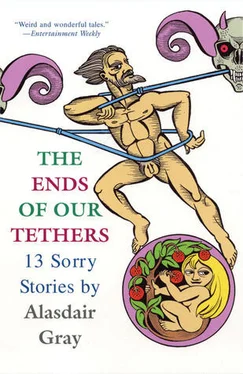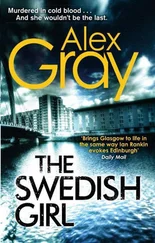I had not and asked if he ever saw Aiblins. “Poor Luke,” said Gentle, “I’d rather not say anything about poor Luke.”
I left the castle with a weird feeling that Aiblins would soon appear again.
Yet was unprepared when the phone rang and a voice said, “Luke Aiblins contacting you as arranged. Remember?”
“I remember you but remember no arrangement. It’s years since you said you’d contact me.”
“I’m doing it. I have a job for you. You’re at home?”
“Yes, but —”
“I’ll be there in ten minutes.”
He hung up on me and arrived in four.
He was no longer beautiful because his nose was thickened and flattened except at the tip, which bent sideways. He was also haggard, with long bedraggled hair, and wore a shabby duffel coat and carried a duffel bag, articles I had not seen since my own student days. His manner was still eager but more tense. I asked if he would like tea or coffee.
“No thanks,” he said, settling into an armchair with the bag between his legs. “Let’s get down to business. You are at last able to help me because you are the king.” “What do you mean?”
“Poet Laureate of Dundee!” he said, grinning.
“I was born there.”
“Honorary Doctorate from Saint Andrews University!” he said, chuckling.
“I was a student there.”
“Winner!” he said, almost inarticulate with laughter, “Winner of the Saltire Award and a colossal Arts Council bursary for Antique Nebula! Antique Nebula!! Antique Nebula!!! ”
“Have you read it?”
“Enough of it to see that it’s crap, rubbish, pretentious drivel, an astonishing victory of sound over sense. You won’t mind me saying that because you’re intelligent so must know it’s crap. I bet you often have a quiet wee laugh to yourself about how you’ve fooled the critics. Ours is a comic opera wee country with several comic opera imitations of English establishments. They’re even thinking of giving us our own comic opera parliament! Our old literary crazy gang, MacDiarmid, Goodsir, Garioch, Crichton Smith et cetera were also crap but they’ve died or are dying and leaving your clique on top. You are now the boss and godfather of Scotland’s literary mafia and at last in a position to help a real poet.”
From the duffel bag he removed and handed me a thin, grubby folder with a tartan cover. I looked into it then told him, “These are the poems your teacher typed twelve years ago.”
“Of course. You said you liked them, so prove it. Get one of your posh London publisher pals to print them. Tell them you’ll write an introduction. Of course you won’t know what to say so I’ll write the introduction. It will appear under your name so you’ll get the credit of introducing a great seminal book that won’t give you any bother at all.”
“Mr Aiblins,” I said, “since you invoke the past let me remind you that I praised these poems for heralding much better work. Where is it?”
“Have you learned nothing in the past twelve years?” he groaned, then with an air of immense patience said, “The voice in my head says there is no point in dictating more poems to me before the first lot are in print, so to get the later poetry we both want, you must first get these published. Send them to Faber or Bloodaxe with a strong letter of recommendation by registered post tomorrow. Phone regularly at weekly intervals and pester them till they’ve read it and offered a decent advance against royalties and a definite publication date. And remember to photocopy them before posting because then you can send single poems —”
I said, “Listen —”
“No! Last time we met I did the listening, now it’s my turn to lay down the law. In the weeks before publication prepare for it by getting single poems published in Stand, Areté, The London Review of Books, The Times Literary Supplement, Chapman and Cencrastus beside good reviews of the book itself by well-known poets rather than academics. I suggest for England, Ted Hughes and Craig Raine; for Ireland, Heaney and Paulin; for Scotland, Lochhead and Duffy; for former colonies, Les Murray, Walcott, Ben Okri and Atwood. We have only one problem. My wife won’t let me into our house, the people I’m staying with are trying to push me out, so for a while I’ll have no contact address. Fear not, I do not plan to camp on your doorstep. I’ll call here once a week for your report on developments at an hour you , not me, will choose. Make it as late or early as you please. Well?”
I said, “Mr Aiblins I am not the godfather of a Scottish literary mafia. There is no such thing. No firm will publish a book, no editor commission a review of it or print a poem from it because I order them. It is also many years since I was employed to show an interest in other folks’ writing. I am now a selfish old bastard who cares for nobody’s writing but his own. Please go away and tell that to as many other writers as you can. But you appear to be in poor circumstances. I am not. By a coincidence I refuse to explain I have seventy pounds in notes upon me. Here, take them. Goodbye!”
“You condescending piss-pot!” he said, smiling as he took the money, “But buying my poems won’t get rid of me. I know they’ll be safe here because your only claim to fame, your only hope of a place in world literature depends on them. So why postpone that? Your Antique Nebula will be forgotten long before critics notice where you got the few good lines in it.” “Are you suggesting that I have plagiarised you?” I cried, horrified, “I deny it! I deny it!”
“You sound as if you believe that,” he said, frowning thoughtfully. “Perhaps you’re unconscious of it. Perhaps most plagiarism is unconscious reminiscence.”
“I am staring hard at that brass-topped coffee table,” I told him, “because it is tempting me to lift it as high as I can in order to smash it down on your idiotic skull. But instead I will phone for the police if you do not take your poems and get the hell out of here.”
“Dearie me, dearie me,” he said waggishly. “I seem to have annoyed the poor old fat bald wee man. He must still envy me. I wonder why?”
He strolled with bag and folder to the front door, which I opened. On the doorstep he turned and said quietly, “One last word of advice. Publish these poems under your own name then try to live up to them. You’ll fail, but the effort may make a real man of you, if not a real writer. And think of the fame you’ll enjoy! I won’t resent that because great poetry is more important than fame. Here, have it.”
I closed the door on him. A moment later the folder, bent double, fell in through the letter box. My self respect felt as if it had been squeezed between the heavy rollers of a mangle. His poems were so strongly associated with this feeling that I could not bear to pick them up. Opening a cupboard holding gas meters I kicked them inside and locked them in. I so dreaded hearing from him again that I fixed an answering machine to my telephone and never took a call direct, but he never called again.
Time passed away. So did the Berlin Wall and the Russian Empire. In The Times Literary Supplement I read reviews of abstruse books by the former Marxist Student who liked classical opera and now had a medical practice in Stuttgart. I discovered that the little Chinese girl who once visited me was now an award-winning feminist poet who wrote popular, very gruesome crime thrillers under a pseudonym. I read her works closely for signs of my influence and detected none at all.
One day I heard a friendly, eager voice say, “Hullo, how are you doing? What are you reading these days?”
I stopped and after a moment recognised poor Aiblins. He was completely bald with many bruises on his head and face and many unhealed cuts between them. He wore jeans, a leather jacket and shambled in a way I had not seen before, but his battered features had amazingly recovered the happily relaxed expression I had first envied.
Читать дальше












